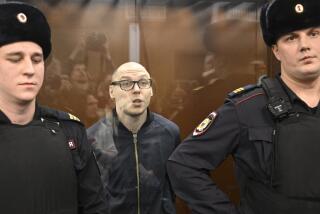‘He Has No Fear’ : Exiled Soviet Rocker Wants to Go Back
- Share via
A Soviet rock musician, imprisoned and forced into exile last year by Soviet authorities, plans to ask Soviet leader Mikhail S. Gorbachev to let him back in with a Christian rock band this year--the year of the Christian millennium in the Soviet Union.
“We’ll see where is perestroika, “ said Valeri Barinov, 43, referring to Gorbachev’s controversial restructuring of the Soviet society and economy.
Barinov spoke this week in Fountain Valley at the U.S. headquarters of Open Doors, a Bible-smuggling organization that sent him bags of Christmas cards after he was jailed for Pentecostal preaching and Christian rock music.
Barinov, an orphan, said he was converted through his aunt in 1971, after which he received the Holy Spirit and began speaking in tongues. He joined a Baptist church in Leningrad, he said.
In 1974, Barinov began secretly recording “The Trumpet Call,” a rock opera telling the story of Christ’s second coming, using equipment left in the Soviet Union by touring Christian musicians.
His lyrics read: “People are lost in the darkness of sin/How much sorrow fills the earth/How many tears are shed each day?/Who brought this evil into the world?/Men hate each other/where does it lead?/Why is there war--what is the need?”
Tapes were smuggled out of the Soviet Union and the opera was later recorded in England by Dave Markee, a former bass player with for Eric Clapton, using English singers. The original version is being distributed in this country by I Care, a nonprofit, Christian organization in Franklin, Tenn.
Neither the KGB nor the conservative Christian community cared for his message, he said. “He faced persecution from Christians who didn’t like what he did and from the KGB who didn’t like what he did,” said Dan Wooding, Open Doors’ communications consultant. But he said Barinov “would not be quiet.”
Barinov--thin, longhaired and wearing denim--said his refusal to change the lyrics led to a brief imprisonment in a psychiatric hospital, then to conviction on false charges in 1984 and a labor camp in the Arctic Circle where he was often placed in solitary confinement in a cell infested with bugs and rats.
There, he said, he continued preaching, baptizing dozens of prisoners and a guard. “If I be silent, the Holy Spirit will leave and I will be empty,” he said. He wore a button proclaiming “Jesus Is My Rock.”
As a result of efforts from Western political and religious organizations, Barinov was released from prison in September, 1986, and given an exit visa but no passport. He emigrated with his wife and two children to England.
Before he left, he developed a following of about 100 Soviet youth in Leningrad and started his own Pentecostal church, Wooding said.
Barinov’s story is confirmed by Keston College, a London-based organization that researches religious persecution, Wooding said.
Barinov went to Washington last month, where he spoke at the Washington-for-Jesus rally, put on by evangelical Christians to show the vitality of religion. He traveled to Orange County to thank those who sent the 1,500 letters to him in prison. He said he saw them in bulk but was not allowed to read them.
Barinov’s fearless enthusiasm is typical of the Christian “wild men” in Communist countries, Wooding said. “He has no fear. He’s made of steel.”
A former reporter for evangelical publications, Wooding has covered Christian persecution in Eastern Bloc countries, Uganda, Cuba and El Salvador.
He estimated that there are 70 million Christians among the 280 million people in the Soviet Union.
Despite the relaxed restrictions on religious freedoms in the Soviet Union in recent months, Wooding said that anyone attempting to bring in Bibles without permission could still be deported and the Bibles confiscated.
Soviet authorities in January approved shipments of 300,000 Bibles, he said, but still have not responded to an offer by Open Doors to send in 1 million Bibles.
“We feel if the Kremlin is serious about glasnost (openness), they would accept them,” Wooding said.
Soviet demand for Bibles is high, Barinov told his audience. “Fifty million is not enough,” he said. “Even atheistic people want to know who they’re fighting.”
This year, the Soviet government is sponsoring tours of Soviet churches and monasteries as part of the millennium, Wooding said. “It’s incredible.”
More to Read
Sign up for Essential California
The most important California stories and recommendations in your inbox every morning.
You may occasionally receive promotional content from the Los Angeles Times.












